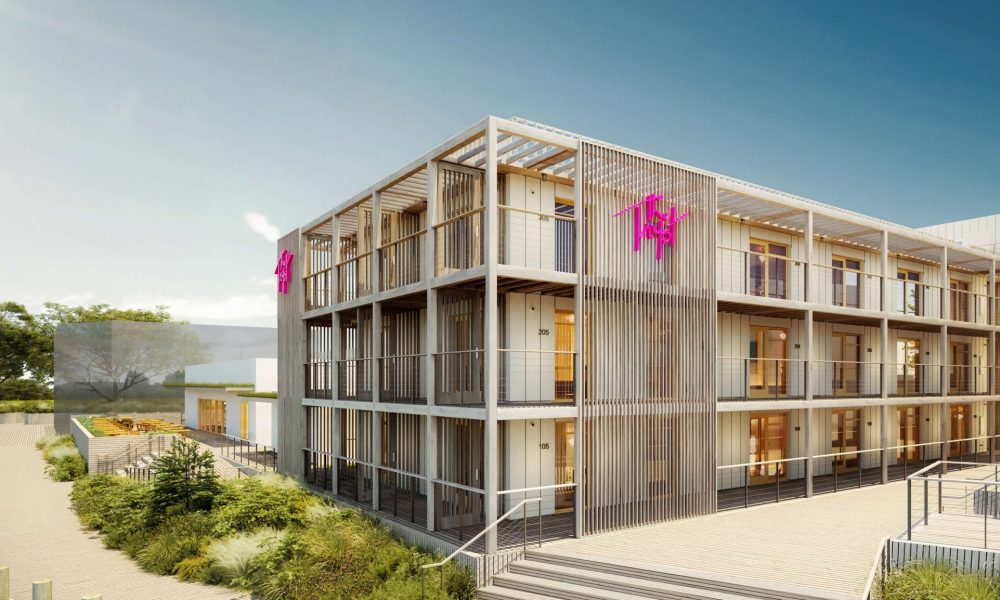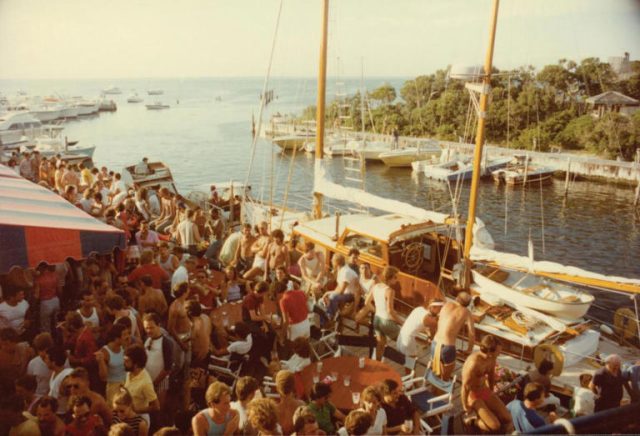Tryst Hospitality is bringing new life and fresh energy to Fire Island Pines with the debut of The Tryst Fire Island, a reimagined version of the beloved Botel and a complete revitalization of The Waterfront at The Pines.
The first look at the highly anticipated property was unveiled this week, revealing 30 upgraded guest rooms, a modernized pool deck, and a fully integrated hospitality experience that transforms the heart of Fire Island Pines.
“Fire Island Pines has long been a haven for queer people,” said Tryst Hospitality Founder & CEO Tristan Schukraft.
“Honoring that legacy means preserving our past while evolving to serve the next generation.”
View this post on Instagram
A Bold Hotel Makeover: Goodbye Botel, Hello Tryst
While maintaining the charm of the original structure, The Tryst Fire Island will feature a full interior refresh. The award-winning team behind The Tryst Puerto Vallarta has redesigned every room with a sleek, modern aesthetic, including ensuite bathrooms—a major upgrade from the Botel’s once-shared facilities.
Schukraft emphasized that the redesign isn’t just cosmetic. “We’re creating a destination that feels sophisticated and effortless—elevated, yet still full of fun.”
The Waterfront at The Pines: A Social Hub Reimagined
More than just a hotel, the project redefines the entire Waterfront at The Pines with a “campus-style” layout connecting:
- The Blue Whale, The Canteen, The Pavilion nightclub, and The Tryst Hotel
- Retail shops, a refreshed gym, and the expanded pool deck
Highlights include:
- A revitalized pool deck with more frequent public access and new events
- A redesigned menu at The Canteen, moving beyond grab-and-go to offer fresh, high-quality meals
- Expanded hours across venues to create a true all-day, all-season experience
- Sustainable landscaping using native plants to beautify and conceal back-of-house operations
- Eco-conscious policies, such as eliminating plastic bottles and partnering with local minority-owned businesses
Investing in People, Not Just Property
In addition to guest amenities, Tryst is investing over $3 million in upgraded staff housing. Seasonal employees will now have air conditioning, WiFi, TVs, and communal lounges—transforming once-basic accommodations into comfortable, modern living spaces.
Behind the scenes, Tryst has also invested in critical infrastructure like plumbing and septic systems to benefit the entire Pines community for years to come.
The Future of Fire Island Nightlife
The fun doesn’t stop at check-in. The Blue Whale will operate as usual in 2025 with an expanded menu and is slated for a major restoration in 2026. The iconic mosaic dance floor, home to the first-ever Tea Dance in 1966, will be preserved and enhanced with new covered areas and a second story.
Meanwhile, The Pavilion nightclub will relaunch High Tea this summer and will undergo a full reimagination in 2026—cementing its place as Fire Island’s nightlife centerpiece.
Making Fire Island More Accessible
Traditionally known for its exclusive rentals and tight-knit community, Fire Island Pines hasn’t always been easy to access. The Tryst Fire Island changes that by offering direct bookings, modern amenities, and affordable luxury for all travelers—no insider hookups required.
With this transformation, Tryst is opening up The Pines to a wider LGBTQ+ audience, ensuring the island’s legacy is both honored and expanded.
More to Come from Tryst Hospitality
The Tryst Puerto Vallarta is now open for previews and officially launches April 25. In 2026, The Tryst San Juan will debut, alongside the highly anticipated reopening of Circo, the iconic gay nightclub just in time for Bad Bunny’s Summer residency.
The Canteen, The Blue Whale, Pavilion, and other venues will begin limited operations in early May, expanding to full summer hours by Memorial Day Weekend.
For updates, follow @thepinesfireisland and @trysthotels, and visit trysthotels.com to book your stay.
Let me know if you’d like a press release version, headline variations, or a social media caption next!




